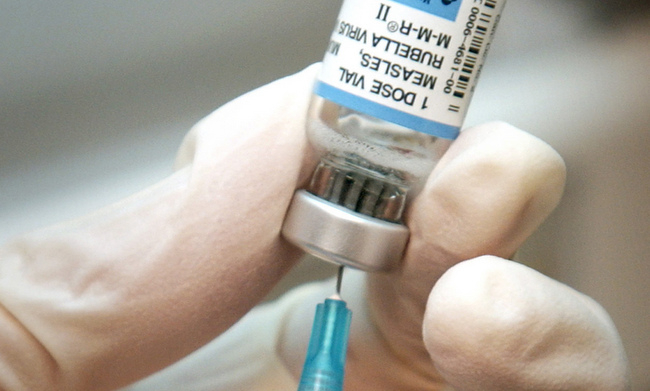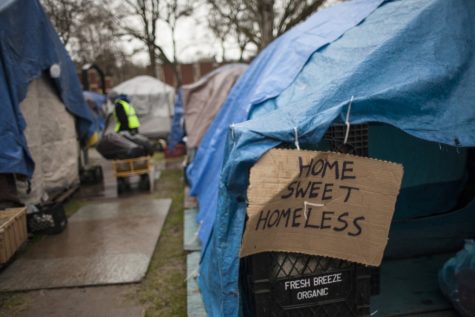Vaccinate Your Children
A nurse draws a dose of mumps-measles-rubella, or MMR, vaccine. A major measles outbreak traced to Disneyland has brought criticism down on the small but vocal movement among parents to opt out of vaccinations for their children. (AP Photo/The Wichita Eagle, Mike Hutmacher, 2006 file)
May 2, 2019
As of 2000, the Centers for Disease Control and Prevention had declared measles eliminated, but a measles outbreak in 2018 would devastate the country once again. As of April 29, 2019, the number of measles cases has skyrocketed to an astounding 704 cases across 22 states. The virus spreads so easily that, according to Vox, even a person’s cough in a room could infect another person who is exposed to the air droplets in that room. Though the virus continues to linger in the air and venture into uninfluenced regions, there has been a particularly high concentration of measles in four states: Washington, California, New Jersey, and New York. A good amount of the communities greatly affected by the virus consist of members of religious groups such as Orthodox Judaism. In New York, the measles outbreak began as a result of travelers that had contracted the disease overseas, most likely in Israel, and brought it back to the states. But how bad are measles, really? Measles is mostly contracted by children, but adults nowadays too have been greatly affected by the virus. After infection, the measles will come upon the person as a fever, and the person will exhibit other symptoms such as coughing, a stuffy nose, or watery eyes. They develop a red rash that grows from the neck and makes its way downwards, but after the rash appears, sometimes the rash goes away in a matter of two to three weeks letting the person free of its terrors. But up to forty percent of measles patients experience complications with the virus, and in that case, they likely die. Children under five are most susceptible to the virus and have the highest death probability. Measles has enraged and worried many people across the country, even including President Trump. Once a vaccine skeptic, the tables have turned on Trump, for nowadays he is evidently in favor of having children vaccinated. Before, Trump was skeptical about the vaccine and its links “to autism.” Such rumors worry thousands of parents, but the claims of these rumors are not true at all. Vaccinations should be given to children in order to suppress the number of outbreaks, cases, and to increase a child’s survival rate.
According to the New England Journal of Medicine, vaccines are one of the most effective tools for preventing infectious diseases and their complications and sequelae. Aside from children who have a negative reaction to a vaccine due to some medical condition, vaccines have more benefits in children’s health than disadvantages, which is why most doctors strongly encourage vaccinations for children. Most vaccine refusers deny vaccines for their children, for they believe it will instigate autism in their children or some other sort of disorder, despite the fact that there is no scientific evidence to support their concerns. Some parents feel that it is best to have their children build natural immunity to disease even though this usually is less effective than annual vaccinations. Concerns like these have led many parents to delay or refuse vaccinations for their children. Considering the doses of vaccines given to Americans, medical professionals deem the amounts “safe.” Additionally, in modernized countries like the U.S., there are vaccines people can receive at no cost at all that are offered just about anywhere, including local grocery stores.
In the U.S., many religious or other sorts of tight-knit communities stress that vaccines are of no good to their faith, but in a country like ours today, when must we compromise our prior beliefs or religious beliefs for the population’s well being? Some people may alter their idea about vaccinations and eventually realize that vaccinations positively affect one’s well-being, especially vulnerable children. It is highly favorable that all participants consider the well-being of the child and the well-being of the entire population. The measles outbreak has become a global warning for all of any age. Public health officials may need to strengthen their vaccination requirements because if they do not, the country will slip into chaos.
Even outside the U.S., many children continue to contract or die from measles because they lack one simple tool—vaccines. If parents fear the worst in vaccinations and neglect to vaccinate their children, their choices may come to devastate them in the future. People in countries like the U.S. have a significant advantage over those who have limited access to vaccines. Neglecting to vaccinate a child not only makes them susceptible to a vast range of viruses such as measles, but if that child were to contract a disease, they could spread it to other children. The decisions of one parent could ultimately affect the fate of an entire population. Hence, if the children of the world are our future, why would we make them more vulnerable to sickness and death? In the U.S., the measles outbreak continues to haunt families for many different reasons, but many of those reasons are not medically concerning. Many people resent vaccinations because it opposes their religious belief or some other belief about vaccines, including the contraction of autism. Though people in the U.S. have the right to freely express themselves or to freely practice a religion, sometimes there will have to be exceptions regarding those practices. If adults continue to neglect vaccinations, our global population will simply deteriorate.







Pamela • May 14, 2019 at 11:54 am
I agree that all children should be vaccinated despite religious practices and other beliefs. Not getting vaccinated can result to bad health and risking ones health is not the best idea. It will also decrease the death rate for children. Being diagnosed with measles can not only affect ones self but will affect many other people around that person. If I had a choice to vaccinate my children i definitely would.